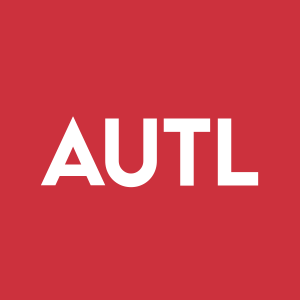Autolus Therapeutics’ CAR T Therapy AUCATZYL® (Obecabtagene Autoleucel) Granted European Marketing Authorization for Adult Patients (age 26 and older) with Relapsed or Refractory B-Cell Precursor Acute Lymphoblastic Leukemia (R/R B-ALL)
Rhea-AI Summary
Autolus Therapeutics (Nasdaq: AUTL) has received European Commission (EC) marketing authorization for AUCATZYL® (obecabtagene autoleucel) to treat adult patients aged 26 and older with relapsed/refractory B-cell precursor acute lymphoblastic leukemia (r/r B-ALL).
The approval is based on the FELIX clinical trial results, where the therapy demonstrated a 76.6% complete response rate in the pivotal cohort (n=94). The median response duration was 21.2 months, with median event-free survival of 11.9 months. Key safety data showed cytokine release syndrome in 68.5% of patients (2.4% grade 3+) and neurotoxicity in 22.8% of patients (7% grade 3+).
This EC authorization follows previous approvals from the FDA and MHRA, covering all 27 EU Member States, Iceland, Norway, and Liechtenstein. In Europe, approximately 6,000 new ALL cases are diagnosed annually, with up to 50% of adult B-ALL patients ultimately relapsing after frontline treatment.
Positive
- High complete response rate of 76.6% in pivotal trial cohort
- Significant median response duration of 21.2 months
- Lower grade 3+ cytokine release syndrome rate (2.4%) compared to typical CAR-T therapies
- Expanded market access with EC approval following FDA and MHRA authorizations
- Addresses high unmet need in r/r B-ALL with poor survival rates
Negative
- Treatment limited to adults aged 26 and older
- 68.5% of patients experienced cytokine release syndrome (though mostly lower grade)
- 22.8% of patients developed neurotoxicity syndrome
News Market Reaction – AUTL
On the day this news was published, AUTL gained 0.83%, reflecting a mild positive market reaction. Argus tracked a trough of -5.4% from its starting point during tracking. Our momentum scanner triggered 12 alerts that day, indicating notable trading interest and price volatility. This price movement added approximately $6M to the company's valuation, bringing the market cap to $694M at that time.
Data tracked by StockTitan Argus on the day of publication.
- Approval is based on FELIX clinical trial of obecabtagene autoleucel (obe-cel) in adult patients with r/r B-ALL, demonstrating high and durable response rates and low toxicity
- EC approval follows positive CHMP opinion, MHRA conditional marketing authorization and FDA approval
LONDON and GAITHERSBURG, Md., July 21, 2025 (GLOBE NEWSWIRE) -- Autolus Therapeutics plc (Nasdaq: AUTL), an early commercial-stage biopharmaceutical company developing, manufacturing and delivering next-generation programmed T cell therapies and candidates, announces today that the European Commission (EC) has granted marketing authorization for AUCATZYL® (obecabtagene autoleucel or “obe-cel”) for the treatment of adult patients, 26+, with relapsed or refractory B-cell precursor acute lymphoblastic leukemia (r/r B-ALL).
The EC approval was based on the results of the FELIX study, an open-label, multi centre, single arm study in adult patients with relapsed or refractory B-cell acute lymphoblastic leukaemia. The results were published in the New England Journal of Medicine in November 20241. In the pivotal cohort of patients, (cohort IIA (n=94)), the Complete Response/Complete Response with Incomplete Haematological Recovery (CR/CRi) for patients who received at least one infusion of obecabtagene autoleucel was
The most common non-laboratory Grade 3 or higher adverse reactions were infections-pathogen unspecified (
“We believe AUCATZYL represents an important new treatment option for physicians treating adult r/r B-ALL patients. With the EU marketing authorization, we are now evaluating market entry opportunities in EU countries,” said Dr. Christian Itin, Chief Executive Officer of Autolus.
Obe-cel is an autologous CD19 CAR T cell therapy with a proprietary CD19 CAR, invented by a team led by Dr. Martin Pule, at University College London, along with collaborators at Great Ormond Street Hospital and University College London Hospital. The CAR is designed to have a fast “off-rate” which mimics physiological T-cell receptor interactions2.
ALL is an aggressive type of blood cancer that can also involve the lymph nodes, spleen, liver, central nervous system and other organs. In Europe, there are approximately 6,0002 new cases of ALL diagnosed every year. In frontline treatment for adult B-ALL, up to
The EC approval applies to all 27 European Union Member States, Iceland, Norway and Liechtenstein. AUCATZYL is currently approved by the U.S. Food and Drug Administration (FDA) and authorized by the U.K. Medicines and Healthcare products Regulatory Agency (MHRA).
References
- Roddie C, et al "Obecabtagene autoleucel in B-cell acute lymphoblastic leukemia" N Engl J Med 2024; DOI: 10.1056/NEJMoa2406526
- https://www.sciencedirect.com/science/article/pii/S0006497120310946?via%3Dihub
- Cancer Research UK - https://www.cancerresearchuk.org/health-professional/cancer-statistics/statistics-by-cancer-type/leukaemia-all/incidence
- Aureli A, Marziani B, Venditti A, Sconocchia T, Sconocchia G. Acute lymphoblastic leukemia immunotherapy treatment: now, next, and beyond. Cancers (Basel). 2023;15:3346.
- Dhakal P, Kaur J, Gundabolu K, Bhatt VR. Immunotherapeutic options for management of relapsed or refractory B-cell acute lymphoblastic leukemia: how to select newly approved agents? Leuk Lymphoma. 2020;61:7-17.
About Autolus Therapeutics plc
Autolus Therapeutics plc (Nasdaq: AUTL) is an early commercial-stage biopharmaceutical company developing, manufacturing and delivering next-generation T cell therapies and candidates for the treatment of cancer and autoimmune disease. Using a broad suite of proprietary and modular T cell programming technologies, Autolus is engineering precisely targeted and controlled T cell therapies that are designed to better recognize target cells, break down their defense mechanisms and eliminate these cells. Autolus has a marketed therapy, AUCATZYL®, and a pipeline of product candidates in development for the treatment of hematological malignancies, solid tumors and autoimmune diseases. For more information, please visit www.autolus.com.
About obe-cel FELIX clinical trial
Autolus’ Phase 1b/2 clinical trial of obe-cel enrolled adult patients with r/r B-precursor ALL. The trial had a Phase 1b component prior to proceeding to the single arm, Phase 2 clinical trial. The primary endpoint in the pivotal cohort was overall response rate, and the secondary endpoints included duration of response, MRD negative complete remission rate and safety. The trial enrolled over 100 patients across 30 of the leading academic and non-academic centers in the United States, United Kingdom and Europe. [NCT04404660].
U.S. Indication and Safety Information
INDICATION
AUCATZYL® is a CD19-directed genetically modified autologous T cell immunotherapy indicated for the treatment of adult patients with relapsed or refractory B-cell precursor acute lymphoblastic leukemia (ALL).
IMPORTANT SAFETY INFORMATION
WARNING: CYTOKINE RELEASE SYNDROME, NEUROLOGIC TOXICITIES, and SECONDARY HEMATOLOGICAL MALIGNANCIES
|
WARNINGS AND PRECAUTIONS
Cytokine Release Syndrome (CRS)
Cytokine Release Syndrome (CRS) occurred following treatment with AUCATZYL. CRS was reported in
Prior to administering AUCATZYL, ensure that healthcare providers have immediate access to medications and resuscitative equipment to manage CRS. During and following treatment with AUCATZYL, closely monitor patients for signs and symptoms of CRS daily for at least 14 days at the healthcare facility following the first infusion. Continue to monitor patients for CRS for at least 4 weeks following each infusion with AUCATZYL. Counsel patients to seek immediate medical attention should signs or symptoms of CRS occur at any time. At the first sign of CRS, immediately evaluate the patient for hospitalization and institute treatment with supportive care based on severity and consider further management per current practice guidelines.
Neurologic Toxicities
Neurologic toxicities including Immune Effector Cell-associated Neurotoxicity Syndrome (ICANS), which were fatal or life-threatening, occurred following treatment with AUCATZYL. Neurologic toxicities were reported in
Immune Effector Cell-associated Neurotoxicity Syndrome (ICANS)
ICANS events occurred in
The median time to onset for ICANS events after the first infusion was 8 days (range: 1 to 10 days) and 6.5 days (range: 2 to 22 days) after the second infusion, with a median duration of 8.5 days (range: 1 to 53 days).
Eighty-eight percent (21/24) of patients received treatment for ICANS. All treated patients received high-dose corticosteroids and
Counsel patients to seek medical attention should signs or symptoms of neurologic toxicity/ ICANS occur. At the first sign of Neurologic Toxicity /ICANS, immediately evaluate patients for hospitalization and institute treatment with supportive care based on severity and consider further management per current practice guidelines.
Effect on Ability to Drive and Use Machines
Due to the potential for neurologic events, including altered mental status or seizures, patients receiving AUCATZYL are at risk for altered or decreased consciousness or coordination in the eight weeks following AUCATZYL infusion or until resolution of the neurological event by the treating physician. Advise patients to refrain from driving and engaging in hazardous occupations or activities, such as operating heavy or potentially dangerous machinery, during this initial period.
Prolonged Cytopenias
Patients may exhibit cytopenias including anemia, neutropenia, and thrombocytopenia for several weeks after treatment with lymphodepleting chemotherapy and AUCATZYL. In patients who were responders to AUCATZYL, Grade ≥ 3 cytopenias that persisted beyond Day 30 following AUCATZYL infusion were observed in
Infections
Severe, including life-threatening and fatal infections occurred in patients after AUCATZYL infusion. Non-COVID-19 infections of all grades occurred in
Grade 3 or higher febrile neutropenia was observed in
Viral reactivation, potentially severe or life-threatening, can occur in patients treated with drugs directed against B cells. There is no experience with manufacturing AUCATZYL for patients with a positive test for human immunodeficiency virus (HIV) or with active hepatitis B virus (HBV) or active hepatitis C virus (HCV). Perform screening for HBV, HCV and HIV in accordance with clinical guidelines before collection of cells for manufacturing.
Hypogammaglobulinemia
Hypogammaglobulinemia and B-cell aplasia can occur in patients after AUCATZYL infusion. Hypogammaglobulinemia was reported in
Immunoglobulin levels should be monitored after treatment with AUCATZYL and managed per institutional guidelines including infection precautions, antibiotic or antiviral prophylaxis, and immunoglobulin replacement.
The safety of immunization with live viral vaccines during or following treatment with AUCATZYL has not been studied. Vaccination with live viral vaccines is not recommended for at least 6 weeks prior to the start of lymphodepleting chemotherapy treatment, during AUCATZYL treatment, and until immune recovery following treatment with AUCATZYL.
Hemophagocytic Lymphohistiocytosis/Macrophage Activation Syndrome (HLH/MAS)
HLH/MAS including fatal and life-threatening reactions occurred after treatment with AUCATZYL. HLH/MAS was reported in
Hypersensitivity Reactions
Serious hypersensitivity reactions, including anaphylaxis, may occur due to dimethyl sulfoxide (DMSO), an excipient used in AUCATZYL. Observe patients for hypersensitivity reactions during and after AUCATZYL infusion.
Secondary Malignancies
Patients treated with AUCATZYL may develop secondary malignancies. T cell malignancies have occurred following treatment of hematologic malignancies with BCMA- and CD19-directed genetically modified autologous T cell immunotherapies. Mature T cell malignancies, including CAR-positive tumors, may present as soon as weeks following infusion, and may include fatal outcomes. Monitor lifelong for secondary malignancies. In the event that a secondary malignancy occurs, contact Autolus at 1-855-288-5227 for reporting and to obtain instructions on the collection of patient samples for testing.
Adverse Reactions
The safety of AUCATZYL was evaluated in the FELIX study in which 100 patients with relapsed or refractory B-cell acute lymphoblastic leukemia (B-ALL) received AUCATZYL at a median dose of 410 × 106 CD19 CAR-positive viable T cells (range: 10 to 480 × 106 CD19 CAR-positive viable T cells with
The most common serious adverse reactions of any Grade (incidence ≥
Please see full Prescribing Information, including BOXED WARNING and Medication Guide.
Forward Looking Statements
This press release contains forward-looking statements within the meaning of the "safe harbor" provisions of the Private Securities Litigation Reform Act of 1995. Forward-looking statements are statements that are not historical facts, and in some cases can be identified by terms such as "may," "will," "could," "expects," "plans," "anticipates," and "believes." These risks and uncertainties include, but are not limited to the impact of worsening macroeconomic conditions on Autolus’ business, financial position, strategy and anticipated milestones, including Autolus’ ability to conduct ongoing and planned clinical trials; Autolus’ ability to obtain a clinical supply of current or future product candidates or commercial supply of obe-cel or any future approved products; Autolus’ ability to obtain and maintain regulatory approval of its product candidates, including obe-cel and potential expansions into additional indications; Autolus’ ability and plans in continuing to establish and expand a commercial infrastructure and to successfully launch, market and sell obe-cel and any future approved products; Autolus’ ability to obtain marketing approval for obe-cel in additional geographies in the future; the delay of any current or planned clinical trials, whether due to patient enrollment delays or otherwise; Autolus’ ability to successfully demonstrate the safety and efficacy of its product candidates and gain approval of its product candidates, including obe-cel and potential expansions into additional indications; Autolus’ ability and plans in continuing to establish and expand a commercial infrastructure and to successfully launch, market and sell obe-cel and any future approved products; Autolus’ ability to obtain marketing approval for obe-cel in additional geographies in the future; the delay of any current or planned clinical trials, whether due to patient enrollment delays or otherwise; Autolus’ ability to successfully demonstrate the safety and efficacy of its product candidates and gain approval of its product candidates on a timely basis, if at all; competition with respect to market opportunities; and possible safety and efficacy concerns. For a discussion of other risks and uncertainties, and other important factors, any of which could cause Autolus’ actual results to differ from those contained in the forward-looking statements, see the section titled "Risk Factors" in Autolus' Annual Report on Form 10-K filed with the Securities and Exchange Commission, or the SEC, on March 20, 2025 as well as discussions of potential risks, uncertainties, and other important factors in Autolus' subsequent filings with the Securities and Exchange Commission. All information in this press release is as of the date of the release, and Autolus undertakes no obligation to publicly update any forward-looking statement, whether as a result of new information, future events, or otherwise, except as required by law. You should, therefore, not rely on these forward-looking statements as representing Autolus’ views as of any date subsequent to the date of this press release.
Contact:
Amanda Cray
+1 617-967-0207
a.cray@autolus.com







